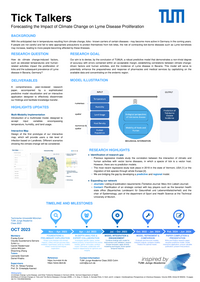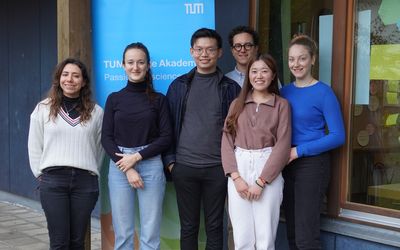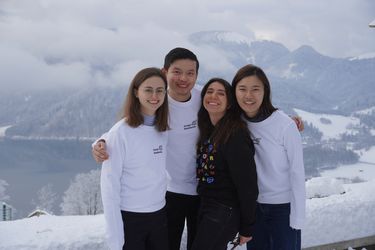Tick Talkers - Collaboration & Impact
Our Goal
We want to maximise our impact by collaborating with already existing structures. We want to leverage expertise from different disciplines and sectors to predict the development of diseases caused by environmental factors in the future to improve the resource management and crisis prevention. We aim for the prevention of resource scarcity within the health sector based on predictive models using historical data from different sectors.
Project Description - Situation Analysis
In recent years, climate change has been discussed more and more. Although strikes like Fridays for Future do a great job of spreading awareness, actions in respect of climate change might still need to be defined or refined. Climate change does not only mean warmer temperatures. It also brings other problems. One serious problem is the dramatic emergence of some diseases around the world. How can we recognize the current situation for a certain disease? How should we respond to this situation? How should we reallocate existing resources to make the best use of them? An interactive website that generates different scenarios of the prevalence of an infectious disease that is spread through a certain vector (so far mosquito) would be a possible helpful tool.
- climate change
- unfamiliar changes of disease behaviours
- longer survival of transmitters like mosquitos, ticks
- medical institutions: need to improve their equipment/ know-how to deal with new situation
- general public as in patients/ people at risk: how to deal with diseases/ how to protect yourself (prevention)
- public administration: new policies, political implications in health system
- pharma industry: new profits/ new resources
- supply chain: avoid bottlenecks/ be prepared
- database/ research institutions/ academia
- Junge Akademie/ Alumni/ Professors: collaboration, as a source
- open source database
- old researches
- WHO website
- pubmed
- RKI
- NCBI
Who We Are
Team
- Carolin Niedermaier (Medicine)
- Claudia Guadarrama Serrano (Chemical Biotechnology)
- Letizia Wörrlein (Sport Science)
- Shaoming Zhang (Physics / CSE)
- Franka Exner (Mathematics)
- Xufan Lu (Information Systems)
Tutors
- Daniel Khadra (Electrical Engineering and Information Technology)
- Leonardo Marco Giannotti (Politicial Science)
Supervisors
- Prof. Niklas Fanelsa - Architecture and Design, TUM School of Engineering and Design
- Prof. Dr. Enkelejda Kasneci - Human-Centered Technologies for Learning, TUM School of Social Sciences and Technology
- Yao Rong - Research Assistant and PhD Student at the Chair of Human-Centered Technologies for Learning, TUM School of Social Sciences and Technology
Contact
You can reach out to us via email: colim@ja.tum.de


